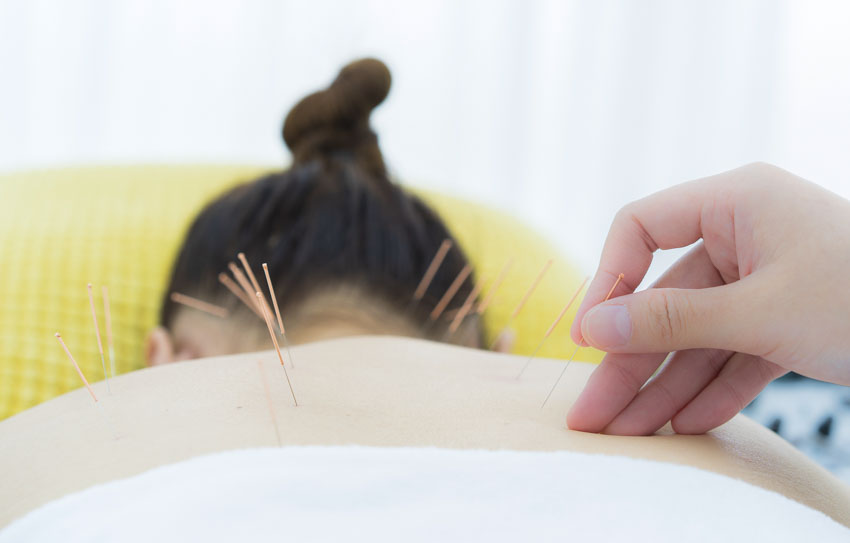
Acupuncture has been found effective for the alleviation of insomnia in modern research. Several investigations make important clinical findings. The first piece of research covered in this article finds acupuncture superior to placebo controls. The second study finds acupuncture effective for improving sleep, reducing anxiety, and increasing neurohormonal endogenous secretions of melatonin.
In a meta-analysis of 1,108 patients, acupuncture was found superior to sham/placebo controls for improving sleep. [1] The study quantified total sleep time, sleep onset latency, sleep efficiency, and waking from sleep after onset. Pittsburgh sleep quality index (PSQI) scores were used to verify the results. Several styles of acupuncture therapy were examined. Auricular, standard body style acupuncture, and electroacupuncture were all found therapeutically effective.
Another investigation published in the Journal of Neuropsychiatry and Clinical Neurosciences by researchers from the University of Toronto (Ontario) and additional sleep and mental health centers (Toronto, Ontario) finds acupuncture effective for the treatment of insomnia and anxiety. [2] The patients did not have herbs, pharmaceuticals, hormonal agents, or other interventions. Using only acupuncture, patients had improved sleep, reduced anxiety, and increases in endogenous secretions of melatonin (aMT6).
A total of 10 acupuncture treatments were administered over a five week period. Improvements occurred in sleep continuity, sleep architecture, fatigue levels, and emotional well-being. The research team quantified improvements in nocturnal melatonin secretions, polysomnographic measures of sleep onset, arousal index, total sleep time, and sleep efficiency. Significant reductions in anxiety scores were also found.
Nocturnal elevations in melatonin levels paralleled the sleep improvements. The researchers note that “acupuncture improved overall sleep quality and had significant effects on anxiety are therefore noteworthy.” [3] They add, “acupuncture was shown to be of value as a therapeutic intervention for insomnia in anxious subjects and may therefore represent an alternative to pharmaceutical therapy for some categories of patients.” [4]
In a related investigation, Emory University and Atlanta VA Medical Center researchers find acupuncture effective for the treatment of sleep disorders for veterans with PTSD and brain injuries. The investigators concluded that acupuncture produces significant improvements in both subjective and objective sleep parameters for veterans with mild traumatic brain injuries (mTBI). This includes veterans with PTSD (post-traumatic stress disorder). The researchers noted that “acupuncture provides meaningful relief for a particularly recalcitrant problem affecting large segments of the veteran population.” [5]
Another investigation concludes that acupuncture is more effective than medications for improving sleep quality for survivors of breast cancer. University of Pennsylvania (Philadelphia), Memorial Sloan Kettering Cancer Center (New York), and Memorial University (Newfoundland and Labrador) researchers concluded that electroacupuncture outperforms gabapentin for improving sleep latency and efficiency for female breast cancer survivors with hot flashes. In a controlled clinical trial, the investigators concluded that acupuncture improves sleep duration and significantly improves sleep latency. [6]
References:
1. Zhang, Jinhuan, Yuhai He, Xingxian Huang, Yongfeng Liu, and Haibo Yu. "The effects of acupuncture versus sham/placebo acupuncture for insomnia: A systematic review and meta-analysis of randomized controlled trials." Complementary Therapies in Clinical Practice (2020): 101253.
2. Spence, D. Warren, Leonid Kayumov, Adam Chen, Alan Lowe, Umesh Jain, Martin A. Katzman, Jianhua Shen, Boris Perelman, and Colin M. Shapiro. "Acupuncture increases nocturnal melatonin secretion and reduces insomnia and anxiety: a preliminary report." The Journal of neuropsychiatry and clinical neurosciences 16, no. 1 (2004): 19-28.
3. Ibid.
4. Ibid.
5. Huang, W., Johnson, T., Kutner, N., Halpin, S., Weiss, P., Griffiths, P. and Bliwise, D., 2018. Acupuncture for treatment of persistent disturbed sleep: A randomized clinical trial in veterans with mild traumatic brain injury and post-traumatic stress disorder. Annals of Physical and Rehabilitation Medicine, 61, p.e89.
6. Garland, Sheila N., Sharon X. Xie, Qing Li, Christina Seluzicki, Coby Basal, and Jun J. Mao. "Comparative effectiveness of electro-acupuncture versus gabapentin for sleep disturbances in breast cancer survivors with hot flashes: a randomized trial." Menopause 24, no. 5 (2017): 517-523.


